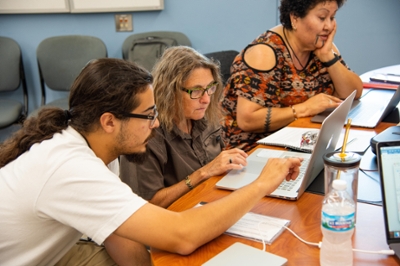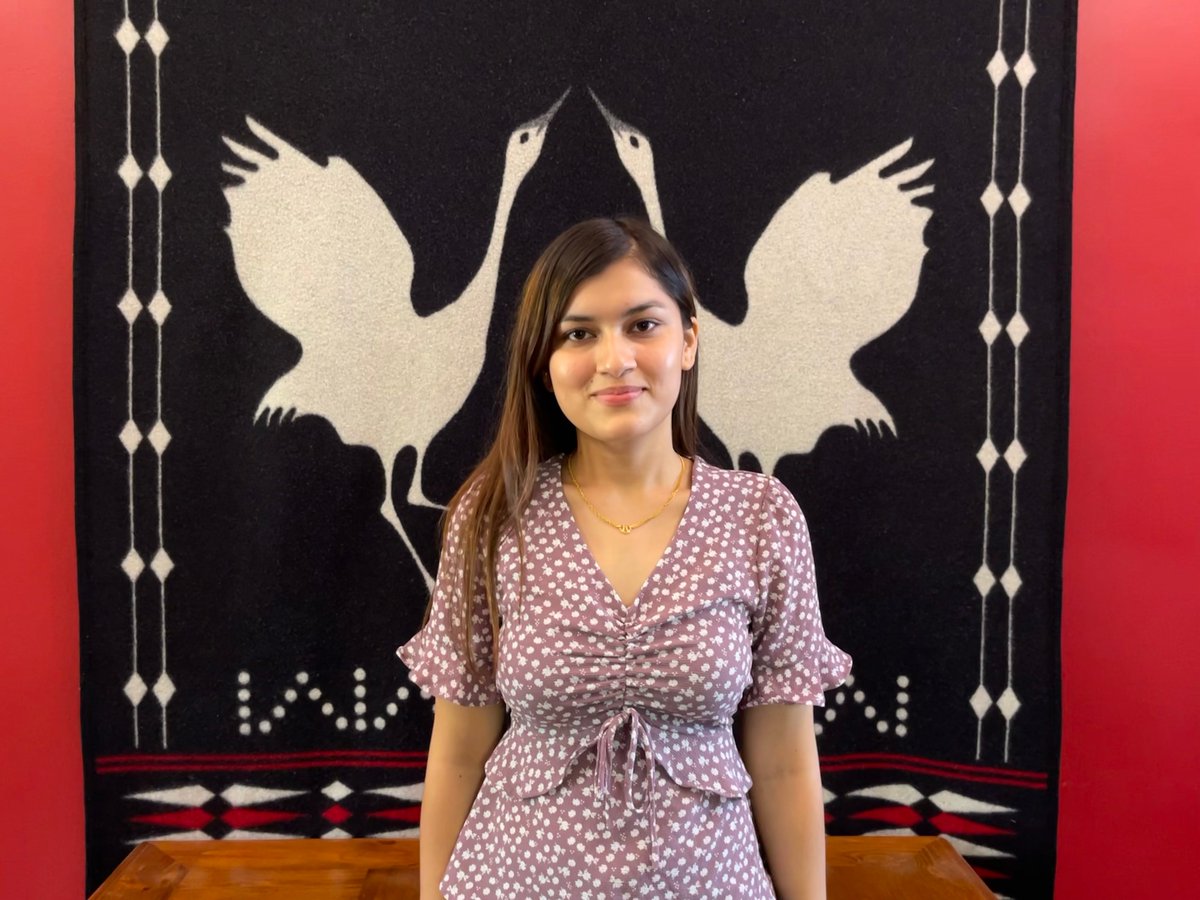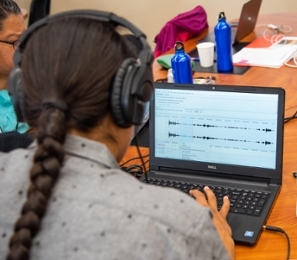

Myaamia Center receives $510,000 Andrew W. Mellon Foundation grant
Funding will support National Breath of Life Archival Institute for Indigenous Languages and further development of Indigenous language archives platform
By Margo Kissell, university news and communications
The Andrew W. Mellon Foundation has awarded a $510,000 grant to the Myaamia Center to support the National Breath of Life Archival Institute for Indigenous Languages (National BoL). The institute — based in the Myaamia Center on Miami University’s Oxford campus — works with endangered language communities to build capacity around methods in archives-based research for community-directed revitalization efforts.

Participants at a National Breath of Life Archival Institute for Indigenous Languages conference in 2019 work together.
The funding will be used to support further development of the Indigenous Languages Digital Archive (ILDA) through distribution and training. ILDA is a web-based software designed to assemble primary source materials of endangered languages into a digital archiving space to facilitate linguistic analysis and development of language learning materials.
"This support will significantly increase the next developmental stages in archive-based research and training for the revitalization of our languages. There is exponential growth in the number of communities utilizing archival materials to support community-directed revitalization activities,” said Daryl Baldwin, an adjunct assistant professor in educational leadership at Miami who co-directs the National BoL with Gabriela Pérez-Báez, an associate professor of linguistics at the University of Oregon.
Since 2011, National BoL has provided training and support to language revitalization practitioners representing more than 63 Indigenous languages in North America.
Through targeted workshops and community specific programming, National BoL supports Native communities in locating, obtaining and working with their archival language materials for the purpose of language revitalization. For communities with few to no first language speakers, archival-based work becomes especially vital.
Baldwin, a citizen of the Miami Tribe of Oklahoma, is executive director of the Myaamia Center, a research-focused collaboration between the Miami Tribe and university. The center has been leading a language and cultural revitalization that has resulted in the first generation in nearly 100 years learning to speak the Myaamia language.
Miami Tribe of Oklahoma Chief Douglas Lankford said, "The Miami Tribe's leadership is committed to supporting the Myaamia Center's activities through National Breath of Life that provide resources and training that directly impact language revitalization activities.”
He added, “When communities succeed at reaching their revitalization goals, we all benefit."
Engineering and computing students help Myaamia Center develop software
Miami President Gregory Crawford said Baldwin’s Native American language and cultural revitalization projects for the National BoL as well as work with the Miami Tribe of Oklahoma through the Myaamia Center, are “having a tremendous impact on the Miami community, the region, and the country.”

Shova Thapa of Nepal, the lead graduate assistant developer for the ILDA database and dictionary websites.
In recent years, Miami’s College of Engineering and Computing students have helped the Myaamia Center develop a wide range of technological tools, including digital archival software that allow analysis of extensive language documents important to the Miami Tribe of Oklahoma language revitalization efforts.
As a graduate student, Chris Anderson (Miami ’19) worked with the Myaamia Center and National BoL to design ILDA. It is currently the only available software that allows for the organization, storage and retrieval of digital copies of linguist archival materials for language revitalization.
Anderson’s adviser, Doug Troy, College of Engineering and Computing professor emeritus, said the interdisciplinary collaboration has benefited the Tribe as well as students learning new skills for their careers.
“It’s a fulfilling experience to be contributing both to the students and to the Myaamia Center moving forward with their research,” said Troy, now coordinator of application development at the Myaamia Center and National BoL.
Today, the IDLA work is being continued by three computer science graduate students working for the Myaamia Center as graduate assistants. Among them is Shova Thapa, the lead graduate assistant developer for the ILDA database and dictionary websites.
Helping communities engaged in archival-based language revitalization
“When Europeans set foot on what is now the U.S. and Canada, estimates indicate that the Native peoples of North America used more than 300 documented languages. Today, living speakers exist for fewer than half those languages,” states the grant application written by Vince Frieden, director of grant writing for University Advancement’s corporate and foundation relations team.

This participant at a 2019 National Breath of Life conference at Miami listens to audio of his tribal language, which can be added to the ILDA for future language learning.
“Scores of other languages are awakening languages — languages that lost their native speakers and are being revitalized using archival language documentation.”
As the National BoL archives development trainer, Jerome Viles provides training and support to communities engaged in archival-based language revitalization.
“Indigenous communities use ILDA to facilitate language revitalization and build online dictionaries of their languages,” Viles said. “ILDA increases the accessibility of archival language materials to a level that allows communities to effectively use the language of their elders and ancestors to support and enhance their language revitalization efforts.”
This Mellon Foundation grant will target important areas of development for National BoL that will increase its impact.
“It will allow us to work with and support even more communities engaged in archival-based language revitalization,” Viles said. “The funding will also support the continued technical development of the ILDA platform to better address and respond to the needs of our user base.”
And it will help them to streamline and expand the web presence through a National BoL website, which Viles said “will act as a one-stop shop for accessing all National BoL programming and training materials.”
